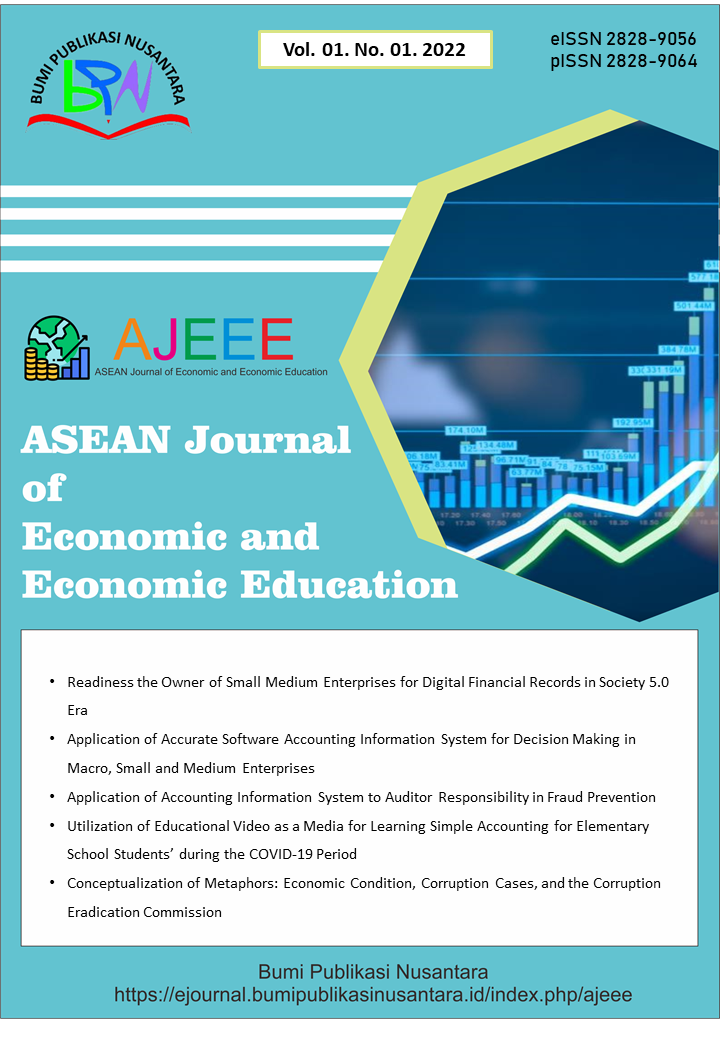Structure Mechanism of Formation of a New World Economic Order in the Conditions of Recovery from the Global Crisis
 ),
),
(1) Department of SAMRT Technologies and the Center for Project Activities of the Moscow Polytechnic University
 Corresponding Author
Corresponding Author
Abstract
Keywords
References
Damayanti, F. N., Kusmawati, P. Navia, V., and Luckyardi, S. (2022). Readiness the owner of small medium enterprises for digital financial records in society 5.0 era. ASEAN Journal of Economic and Economic Education, 1(1), 1-8.
Glazyev, S. Y. (2016). World economic patterns in global economic development. Economics and Mathematical Methods, 52(2), 3-29
Glushchenko, V. V. (2021a). Forecasting the directions of modernization of economic sectors and regions of the country during the development of the eighth technological order. International Journal of Engineering Technologies, 5(6), 23-42.
Glushchenko, V. V. (2021b). Management system for the development of industrial social relations of a new technological order. International Journal of Scientific Advances, 2(4), 554-563.
Glushchenko, V. V. (2021c). Socio-economic transformations and mental conflicts during the development of the sixth technological order. Kazakhstan Science Journal, 4(6), 12-26.
Glushchenko, V. V. (2022). Crisis studies as a methodology for studying crises associated with the process of forming a new technological order. International Research Journal, 6(120), 120-126.
Glushchenko, V. V. (2023) The scientific and practical significance of the paradigm of the development of scientific support of the 10th technological order in the world economy. ASEAN Journal of Science and Engineering Education, 3(3), 245-264.
Leksin, V. N. (2020). Synthesis of consumer society and information society. Contours of Global Transformations Politics, Economics, Law, 13(2), 195-211.
Maheshvari, R. (2022). Study on economic, sustainable development, and fuel consumption. ASEAN Journal of Economic and Economic Education, 1(1), 41-46.
Matveeva, L. G., and Kaplina, A. V. (2020). Directions of digital ecosystem development in regions with different economic structures. Bulletin of the Academy of Knowledge, 40(5), 274-279.
Nikitskaya, E. F., and Valishvili, M. A. (2021). International trends in the development of network innovation systems in the digital economy. Economic Relations, 11(4), 689-712.
Ragahita, R., and Nandiyanto, A. B. D. (2022). Computational bibliometric analysis on publication of techno-economic education. Indonesian Journal of Multidiciplinary Research, 2(1), 213-220.
Ramos, R. N. L. (2021). Approaches of the leading world powers to the formation of a new world order. Ethnosocium and Interethnic Culture, 9(159), 17-28.
Samoylyukov, Y. N. (2018). Network economy traditional economy and "enemies" or "friends". Colloquium Journal, 3(14), 53-55.
Supriyadi, A., Wang, T., Juwita, M., Gunaningrat, R., Safitri, S., and Cirella, G. (2021). Sustainability policy in Indonesia: Case study economic structure and determinants in banjar municipality. International Journal of Informatics, Information System and Computer Engineering (INJIISCOM), 2(1), 25-46.
Tsvetkov, Y. A. 2020. Reassessment of the second world war as a strategy for deconstructing the world order. Military Law Journal, 12(2020), 27-31.
Vladimirovich, G. V. (2022a). Neurotechnologies in geopolitics, management, economics during the global crisis and hybrid wars. Security Issues, 1(2), 24-40.
Vladimirovich, G. V. (2022b). Neurotechnologies in geopolitics, management, economics during the global crisis and hybrid wars. Security Issues, 2(3), 1-18.
Widianti, R. I. L., and Undang, S. U. (2022). Conceptualization of metaphors: Economic condition, corruption cases, and the corruption eradication commission. ASEAN Journal of Economic and Economic Education, 1(1), 35-40.
Article Metrics
Abstract View : 1026 times
: 1026 times Download : 648 times
Download : 648 times
Refbacks
- There are currently no refbacks.
Copyright (c) 2022 Yayasan Bumi Publikasi Nusantara

This work is licensed under a Creative Commons Attribution-ShareAlike 4.0 International License.



_publication_ethics1.png)



